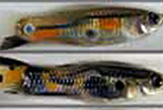
Get the world’s most fascinating discoveries delivered straight to your inbox.
You are now subscribed
Your newsletter sign-up was successful
Want to add more newsletters?

Delivered Daily
Daily Newsletter
Sign up for the latest discoveries, groundbreaking research and fascinating breakthroughs that impact you and the wider world direct to your inbox.

Once a week
Life's Little Mysteries
Feed your curiosity with an exclusive mystery every week, solved with science and delivered direct to your inbox before it's seen anywhere else.

Once a week
How It Works
Sign up to our free science & technology newsletter for your weekly fix of fascinating articles, quick quizzes, amazing images, and more

Delivered daily
Space.com Newsletter
Breaking space news, the latest updates on rocket launches, skywatching events and more!

Once a month
Watch This Space
Sign up to our monthly entertainment newsletter to keep up with all our coverage of the latest sci-fi and space movies, tv shows, games and books.

Once a week
Night Sky This Week
Discover this week's must-see night sky events, moon phases, and stunning astrophotos. Sign up for our skywatching newsletter and explore the universe with us!
Join the club
Get full access to premium articles, exclusive features and a growing list of member rewards.
For male guppies, being unique is good for more than just attracting the ladies—it could mean the difference between life and death.
A new study finds that guppies with rare color patterns are less likely to be gobbled by prowling predators than their commonly colored counterparts. The finding is an example of how nature sometimes favors rare traits.
The four-year study, detailed in the June 1 issue of the journal Nature, involved manipulating the ratio of rare and common fish in 19 twin pools in three different streams in Trinidad.
At each site, one of the pools was manipulated so that guppies with pattern A outnumbered those of pattern B by a ratio of 3-to-1; in the other pool, the population was tweaked the other way, so that B outnumbered A. Each pool also harbored killifish or pike cichlids, both of which prey on guppies.
After about two weeks, the researchers collected all the adult-sized guppies. Rare males had higher survival at all three streams: 84 percent of the rare-type males survived the experiment, compared to only 69 percent of the common-type males.
Male guppies don't normally engage in deadly duels, so the most likely explanation for the dip in population size is that some guppies were eaten, the researchers say.
"It's possible that guppy predators, which are known to hunt visually, may be more focused on common color patterns," said study team member Kimberly Hughes of the University of Illinois at Urbana-Champaign. "Predators can form 'search-images' of the most common prey types, and can be less efficient at locating and capturing prey that look different from the norm."
Get the world’s most fascinating discoveries delivered straight to your inbox.
Another possibility is the guppies altered their behavior in response to the researchers' manipulations, and that the changed behaviors affected predation. More research will be needed to distinguish between these two possibilities.
The finding is an example of what biologist call "negative frequency-dependent selection," in which natural selection favors rare traits over common ones. It's been hypothesized that a similar process could explain why a small percentage of humans are left-handed . According to one idea, left-handed fighters have a surprise advantage over their right-handed adversaries.
 Live Science Plus
Live Science Plus










